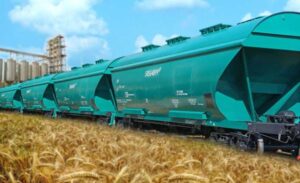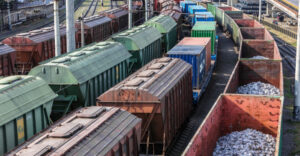
Ukrzaliznytsia received 2,000 tons of high-tech R-65 rails from Japanese manufacturer Nippon Steel, with another 1,000 tons expected to be delivered by the end of January, according to a press release from the Ministry of Community and Territorial Development on Thursday.
According to the release, this cooperation was made possible within the framework of the third phase of the emergency recovery program through the Japan International Cooperation Agency (JICA).
“This was the result of systematic interaction and successful agreements with Japanese partners on the part of the Ministry in early 2025. Ukraine currently does not have its own rail production, so attracting partner support is necessary and crucial for the functioning of the Ukrainian railway,” the ministry emphasized.
It is noted that the cooperation currently involves the transfer of 3,000 tons of rails for a total amount of about $4 million.
The ministry specified that railway workers use mobile complexes to weld rails directly on the tracks and thermally join joints, resulting in the creation of a so-called “velvet track” without joints, which increases its service life and ensures smooth train movement.
“We are sincerely grateful to the Government of Japan for its strategic support, which allows us not only to maintain the network, but also to carry out major repairs in accordance with the highest international standards, ensuring reliable connections even in the most difficult times,” said Marina Denisyuk, Deputy Minister of Community and Territorial Development, in a press release.
The Ministry of Development recalled that support from the Japanese government and JICA has continued since the beginning of the full-scale invasion by the Russian Federation. In particular, during this period, almost 25,000 tons of rails have been delivered, which has made it possible to renovate more than 193 km of tracks on strategic routes of the Lviv, South-Western, Dnipro, Southern, and Odesa railways.
In addition, railway workers also received 24 units of construction and loading/unloading equipment from Komatsu, Toyota, and Sonalika, 22 of which were track equipment, and the total cost of equipment and materials supplied during the first two phases of the program exceeded $42 million, the agency noted.
“The delivered equipment, namely wheel excavators, loaders, and bulldozers, has already worked more than 13,000 motor hours on emergency repair work,” the agency emphasized.

In January 2026, Ukrzaliznytsia will raise prices for most types of rolling stock, with only the cost of transportation by grain carriers and container platforms remaining unchanged, corresponding to the December rates of UAH 1,250/day and UAH 203/day (excluding VAT), respectively.
According to the tariffs published on the company’s website, in January 2026, compared to December 2025, the cost of tank cars for transporting food products will increase from UAH 738/day to UAH 938/day (excluding VAT), mineral carriers – from 203 UAH/day to 450 UAH/day (excluding VAT), and semi-cars – from 1350 UAH/day to 1450 UAH/day (excluding VAT).
Ballast and cement tankers will increase in price by 100 UAH/day, to 703 UAH/day and 1,300 UAH/day (excluding VAT), respectively.
The cost of fitting platforms will also change: 40-foot platforms will increase from 750 UAH/day to 900 UAH/day (excluding VAT), 60-foot platforms — from 850 to 900 UAH/day, and 80-foot platforms will increase from 1250 to 1450 UAH/day (excluding VAT).
The cost of tanks for transporting liquefied gas will increase by 400 UAH to 603 UAH/day (excluding VAT) in January.
Only flatbed timber trucks will become cheaper by 200 UAH, to 1360 UAH/day (excluding VAT).

Ukrzaliznytsia has equipped 100 of its own railcars as temporary mobile heating, communication, and leisure centers in response to power outages across the country, the company said in a statement on Tuesday.
“Ukrzaliznytsia, with the help of its partners—All Hands&Hearts, World Central Kitchen, Hachiko Foundation, and White Stork—has equipped 100 of its railcars as temporary mobile heating, communication, and leisure centers,” the company said in a statement on its Telegram channel.
It is noted that the railcars have a full heating system. In addition, they are equipped with chargers from generators and portable power sources, microwaves, refrigerators, and Starlink kits for uninterrupted communication.
Ukrzaliznytsia added that each of the 100 carriages can be used at the request of local authorities as a free mobile hub with a constant autonomous power supply.
Separately, the company noted that the cars have a children’s compartment equipped with play sets, as well as a compartment for a comfortable stay with pets.

The volume of freight traffic carried by Ukrzaliznytsia in 2025 will decrease by 7% compared to last year, from 173 million tons to 160 million tons, and in subsequent years it will only be possible to increase it to 161 million tons and 162 million tons, respectively, the company announced to journalists during a presentation on November 7.
According to the presentation, it is expected that in 2025-2026, the volume of ore and manganese transportation will amount to 44 million tons compared to 43 million tons last year, and in 2027, it will decrease to 42 million tons.
Grain and flour transportation in 2025-2027 is forecast at 31 million tons, which is 22.5% or 9 million tons less than in 2024.
Ukrzaliznytsia noted that it expects a reduction in the transportation of building materials from 35 million tons in 2024 to 30-32 million tons in 2025-2027.
According to the presentation, coal transportation volumes in 2025-2027 will decrease by 17.4% compared to 2024, from 23 million tons to 19 million tons.
The company plans to partially offset these losses by increasing the transportation of other cargo from 32 million tons last year to 36 million tons this year, and then increasing it by 1 million tons annually.
Ukrzaliznytsia added that the total volume of cargo transportation from 2021 to 2025 decreased by 49% – from 315 million tons to 160 million tons. In particular, during this period, there was a 43% reduction in ore transportation, 52% in building materials, and 62% in coal.
According to the presentation, the forecast for the profitability of freight transportation is even worse: last year’s profit of UAH 20.4 billion will decrease to UAH 3.2 billion next year, and the following year, freight transportation will bring a loss of UAH 0.6 billion, and in 2027 – UAH 4.8 billion.
The company cites the freezing of tariffs, which were last increased in 2022, as the reason, although the producer price index has risen by 69.3% since then.
In September 2025, Valery Tkachov, deputy director of the commercial department of Ukrzaliznytsia, reported that the company expects freight traffic to decline this year to 162-165 million tons from 175 million tons last year, after partially recovering from a drop to 150-155 million tons in the first two years of Russia’s full-scale aggression from 312-315 million tons.
Tkachov then stressed that in order to rectify the situation, an active search for new cargoes is underway, in particular, retail and small and medium-sized business cargoes, ranging from forest products to industrial products and a large number of other segments.
Serhiy Leshchenko, deputy chairman of the supervisory board of Ukrzaliznytsia, reported last week in the Verkhovna Rada that the company’s net loss for the first nine months of this year amounted to UAH 7.195 billion.
According to him, the company proposes to index freight tariffs by 27.5% from January 1 next year and by another 11% from July 1.
The volume of Ukrzaliznytsia’s export shipments in January-June 2025 decreased by 13.5% to 38.7 million tons, domestic shipments by 11.7% to 35.5 million tons, while the volume of import transportation increased by 5.4% to 5.3 million tons.
In 2024, the company increased its revenue by 11.1% to UAH 102.87 billion, but incurred a net loss of UAH 2.71 billion compared to a net profit of UAH 5.04 billion in 2023.

“To ensure sustainable operations in 2026, Ukrzaliznytsia (UZ) must cover a liquidity deficit of around UAH 48.8 billion, excluding the repayment of Eurobonds, whose debt is to be restructured,” said CEO Oleksandr Pertsovsky on Friday during a presentation on passenger transport financing and the model for launching the UZ-3000 program.
“We have chosen the most balanced model to cover this deficit: part of it will be provided by our internal optimization, part by tariff decisions, and the third part by state support for passenger transport. There are no other realistic ways to get through these years in the context of the war,” he emphasized.
According to him, the amount of state co-financing for passenger transport will amount to up to UAH 13 billion in 2025 and will increase to more than UAH 16 billion in 2026.
According to Pertsovsky, operating losses in passenger transport total UAH 24 billion per year (UAH 13 billion for long-distance transport and UAH 11 billion for local transport), and while it was previously possible to offset these losses at the expense of profits in freight transport, this is impossible during the war.
According to the presentation, the expected loss in the passenger transport segment will increase from UAH 18.1 billion last year to UAH 18.6 billion this year, UAH 21.9 billion next year, and UAH 24.4 billion in 2027.
Suburban transport is expected to lose UAH 10.9 billion next year, domestic transport UAH 13.4 billion, and only international passenger transport will be profitable, with UAH 2.4 billion.
At the same time, UZ forecasts that profits from freight transport will decline from UAH 20.4 billion last year to UAH 3.2 billion this year, with a loss of UAH 0.6 billion next year, increasing to UAH 4.8 billion in 2027.
The reasons for this change in the profitability of freight transport are a reduction in volume (coal – by 4 million tons, grain – by 9 million tons after the artificial peak in 2024) and a reduction in transport distances, resulting in a loss of UAH 14.5 billion in freight revenue, as well as rising costs (personnel, electricity, financial costs) with frozen tariffs, which means an additional UAH 2.7 billion in expenses.
According to the presentation, the projected net loss for next year is UAH 28.64 billion.
In addition, the company expects UAH 25.4 billion in critical restructuring costs with depreciation of UAH 15.9 billion, UAH 6.4 billion in interest payments on Eurobonds, and UAH 4.2 billion in repayments of EBRD and EIB loans, which together result in a liquidity deficit of UAH 48 billion, according to the presentation.
As part of its own optimization, UZ has proposed an economic effect of almost UAH 17 billion in 2026, of which UAH 6.7 billion has already been taken into account in the draft financial plan. A further UAH 10.2 billion is to be achieved by reducing administrative costs, transferring non-core assets, cooperating with the freight market, and increasing its own revenues.
According to the presentation, the optimization measures include the elimination of 69 of the most unprofitable suburban routes (up to 5,000 per day), the indexation of unregulated elements (commissions, services), and flexible dynamic pricing for individual segments, which are expected to generate a total of UAH 6.9 billion.
In addition, there are plans to optimize the workforce by 8,300 employees, merge regional railways, and optimize up to 1,200 km (less than 5%) of the network with no or minimal traffic (1-2 suburban pairs).
Energy efficiency measures also include operating during intervals with the lowest fares, doubling rental income (+UAH 100 million), the sale of surplus and non-core assets, the sale of scrap metal (over 370,000 tons, which is more than UZ has sold in the last 5 years and secures the company a 28% share of the scrap market), and reducing repairs to passenger cars, regional trains, and infrastructure.
Ukrzaliznytsia points out that the financing model for passenger transport is in line with the European practice of public service obligation (PSO), whereby the state covers the difference between economically justified costs and tariffs.
Earlier this week, Serhiy Leshchenko, deputy chairman of the UZ supervisory board, told the Verkhovna Rada that the company’s net loss for the first nine months of this year amounted to UAH 7.195 billion.
According to him, UZ proposes to index freight tariffs by 27.5% from January 1 next year and by another 11% from July 1.
In January-June 2025, UZ’s export traffic decreased by 13.5% to 38.7 million tons, domestic traffic decreased by 11.7% to 35.5 million tons, while import traffic increased by 5.4% to 5.3 million tons.
Passenger traffic increased by 1.2% to 13.52 million in the first half of 2025.
In 2024, UZ increased its revenue by 11.1% to UAH 102.87 billion, but reported a net loss of UAH 2.71 billion, compared to a net profit of UAH 5.04 billion in 2023.